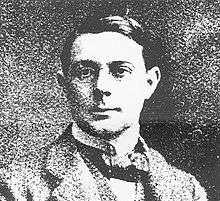North Cumberland by-election, 1926
The North Cumberland by-election of 1926 was held on 17 September 1926. The by-election was held due to the succession to the peerage of the incumbent Conservative MP, Donald Howard. It was won by the Conservative candidate Fergus Graham.[1]
Vacancy
The by-election was held due to the succession to the peerage of the incumbent Unionist MP, Donald Howard. He had been MP here since winning the seat in 1922.
Election History
Cumberland North was created for the 1918 General Election. At that election, the Unionist candidate, endorsed by the Coalition Government, was returned unopposed. The first actual electoral contest occurred in 1922 when Howard narrowly held the seat for the Unionists, in a 2-way contest with the Liberal. At the 1923 General Election, Howard again narrowly held off the new Liberal challenger, R.D. Holt. At the 1924 General Election, a Labour Party candidate intervened for the first time. This damaged Holt's prospects and Howard was easily re-elected;

| Party | Candidate | Votes | % | ± | |
|---|---|---|---|---|---|
| Unionist | Hon. Donald Stirling Palmer Howard | 10,586 | 54.2 | +3.6 | |
| Liberal | Richard Durning Holt | 6,821 | 34.9 | -14.5 | |
| Labour | B. Brooke | 2,125 | 10.9 | n/a | |
| Majority | 3,765 | 19.3 | +18.1 | ||
| Turnout | 86.0 | +2.8 | |||
| Unionist hold | Swing | +9.0 | |||
Candidates
- The Cumberland North Unionist Association chose 33-year-old, first time candidate Captain Fergus Graham to defend the seat. He was the son of Sir Richard James Graham, and Lady Mabel Cynthia Duncombe. He was educated at Eton College and Christ Church, Oxford. He served in the European War with the Irish Guards from 1914–19. In 1918 he married Mary Spencer Revell Reade, daughter of Major-General Raymond Northland Revell Reade and Rose Frances Spence.[3]
- The Cumberland North Liberal Association re-adopted 58-year-old Liverpool shipowner R.D. Holt as their candidate. In addition to being Liberal candidate here in 1923 and 1924 he had been Liberal MP for Hexham from 1907-18. He first stood as Liberal candidate at Liverpool West Derby in 1904 and 1906. He was also Liberal candidate for Eccles in 1918 and Rossendale in 1922. Holt was born at Toxteth Park, Lancashire, the son of Robert Durning Holt, Lord Mayor of Liverpool, a cotton broker, by his wife Lawrencina Potter. He was educated at Winchester and New College, Oxford.[4] Holt married Eliza Lawrence Wells in 1897. They had three daughters, of whom the eldest, Grace, married Anthony Methuen, 5th Baron Methuen.
- The Cumberland North Constituency Labour Party selected H.W. McIntyre as their candidate. He was a schoolmaster from Whitley Bay, Northumberland.[5]
Campaign
Polling Day was set for 17 September 1926.
Liberal divisions
In 1926, the Liberal Party was internally divided between the supporters of party leader H.H. Asquith and parliamentary party chairman David Lloyd George. The 1926 General Strike had seen the two men take differing positions on the issue and Asquith publicly criticised Lloyd George's position. Holt had never been either a supporter of Lloyd George or the interventionist social liberal policies he had advocated in the past or was again advocating. Holt was a member of the 'Liberal Council' a body of Asquithian Liberals intent on frustrating Lloyd George.[6] Although the ailing Asquith was still nominally the Liberal Party leader, increasingly Lloyd George was regarded as the leader in waiting. Therefore the decision of Lloyd George to neither visit the constituency during the by-election nor to issue a letter of support to Holt's candidacy, did not help the Liberal campaign.
Result
There was a swing of 4.3% from Unionist to Liberal, but not a big enough swing to take the Liberals to victory. The Labour Party vote share went up.
| Party | Candidate | Votes | % | ± | |
|---|---|---|---|---|---|
| Unionist | Frederick Fergus Graham | 8,867 | 47.8 | -6.4 | |
| Liberal | Richard Durning Holt | 6,871 | 37.1 | +2.2 | |
| Labour | H. W. McIntyre | 2,793 | 15.1 | +4.2 | |
| Majority | 1,996 | 10.7 | -8.6 | ||
| Turnout | 82.0 | -4.0 | |||
| Unionist hold | Swing | -4.3 | |||
Aftermath
Three years later at the 1929 General Election, there was a Graham/Holt re-match with a new Labour candidate. Graham was again the victor, despite a further swing of 3.8% to the Liberals;
| Party | Candidate | Votes | % | ± | |
|---|---|---|---|---|---|
| Unionist | Frederick Fergus Graham | 10,392 | 44.9 | -2.9 | |
| Liberal | Richard Durning Holt | 9,661 | 41.7 | +4.6 | |
| Labour | C. A. O'Donnell | 3,092 | 13.4 | -1.7 | |
| Majority | 731 | 3.2 | -7.5 | ||
| Turnout | 83.7 | +1.7 | |||
| Unionist hold | Swing | -3.8 | |||
Graham remained the member until his defeat by a Liberal in 1935. He later served as MP for Darlington from 1951-59. Holt did not stand for parliament again.
References
- ↑ http://www.leighrayment.com/commons.htm
- ↑ F W S Craig, British Parliamentary Election Results 1918-1949; Political Reference Publications, Glasgow 1949
- ↑ 'GRAHAM, Sir (Frederick) Fergus’, Who Was Who, A & C Black, an imprint of Bloomsbury Publishing plc, 1920–2016; online edn, Oxford University Press, 2014 ; online edn, April 2014 accessed 10 Aug 2016
- ↑ thepeerage.com Sir Richard Durning, 1st Bt.
- ↑ OUR SPECIAL CORRESPONDENT. "The Fight For Cumberland." Times [London, England] 15 Sept. 1926: 12. The Times Digital Archive. Web. 10 Aug. 2016.
- ↑ The Downfall of the Liberal Party, Trevor Wilson
- ↑ British parliamentary election results 1918-1949, Craig (See F. W. S. Craig#Bibliography)
- ↑ F W S Craig, British Parliamentary Election Results 1918-1949; Political Reference Publications, Glasgow 1949